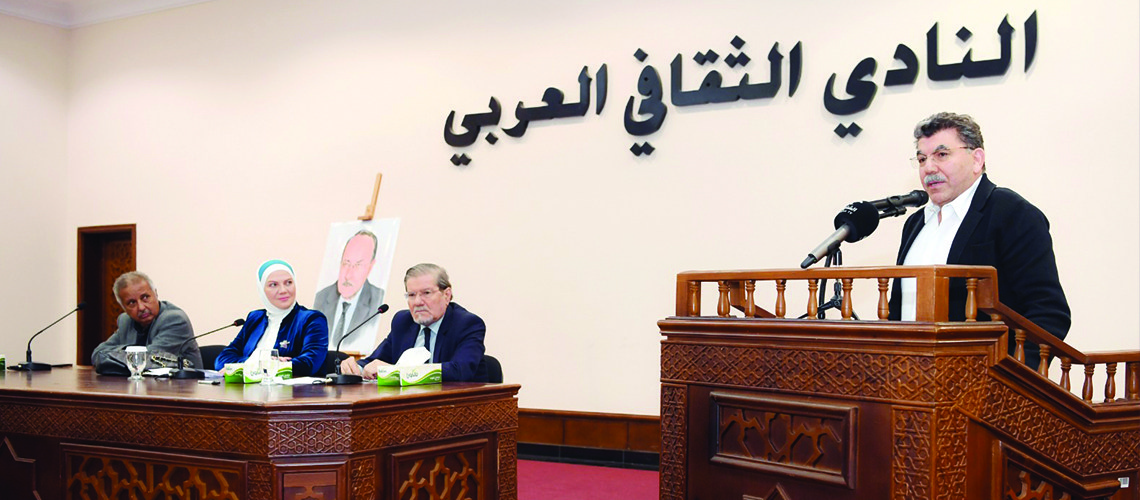The Arab Cultural Club in Sharjah orchestrated a poignant commemorative evening on Friday, February 1, 2024, dedicated to honouring the esteemed memory of the late writer and critic Izzat Omar. Having bid farewell to this world on December 22, 2023, the late Izzat Omar, bequeathed a profound legacy marked by his invaluable publications and books. His literary endeavours not only enriched the cultural tapestry of the UAE but also left an indelible mark on the broader literary landscape of the Arab world.
The event showcased Dr. Omar Abdulaziz, Chairman of the Club’s Board of Directors, and Nawaf Younis, Editor-in-Chief of Sharjah Cultural Magazine, in a compelling dialogue skilfully moderated by Maria Muhyiddin.
Attended by family members and friends of the late writer, the evening featured a poignant documentary shedding light on the life of Ezzat Omar, who was born in Manbij, Syria, and graduated from the Faculty of Arts at the University of Aleppo in 1977. A distinguished member of the Emirates Writers Union and an editor at Sharjah Cultural Magazine, Ezzat Omar also played a pivotal role as a judge on numerous literary juries over several decades.
Ezzat Omar, honoured with the Sharjah Award for the best book on the UAE in 2019, stands as the author of over 20 books, predominantly centred on Emirati narrative. His extensive literary contributions encompass notable works such as “A Cage Looking for Birds,” along with two collections of children’s stories titled “Golden Windows” and “Butterfly Wings.” Additionally, Ezzat Omar crafted the acclaimed “Ghassan” series of novels tailored for young readers.
In the realm of criticism, Ezzat Omar penned thought-provoking works including “Sea Mirrors”, “Trends of Narrative Discourse in the Emirati and Arab Novel”, “The Sociology of the Emirati Narrative”, “The Impact of Modernism and Post-Modernism on Emirati Narratives”, and “Nasser Jubran: The Shine of Writing and the Anxiety of the Artist”.
Maria Muhyiddin opened the evening with heartfelt words, expressing, “Ezzat Omar may have departed our world, but his path endures, for in his departure, he left behind an indelible mark as a beacon of light and knowledge. To you, O inspirer of aesthetic understanding and the essence of love and life, Ezzat Omar, your departure has taught me that life is a fleeting journey trodden by dedicated and faithful souls, leaving behind a beautiful imprint in our hearts. Their departure, however, takes away the light from our eyes, leaving in our hearts a poignant void, in our souls a burning ache, and in our eyes, a cascade of a thousand tears.”
Dr. Omar Abdulaziz remarked: “Ezzat Omar possessed a robust aesthetic and critical taste, coupled with an extensive understanding of modernist concepts and a profound grasp of history. These attributes endowed him with the ability to delve into the depths of texts, crafting unique concepts that formed a tributary of criticism and became a prominent face of Arab cultural convergence.”
Nawaf Younis commenced his testimony by saying: “The true intellectual is the one who influences his surroundings and is, in turn, influenced by them; a description befitting the late Ezzat Omar. I first encountered him in 1990 within the cultural section of the Al Khaleej newspaper when the cultural landscape in the UAE was experiencing its peak of formation and activity. The Al Khaleej newspaper published his inaugural novel, ‘A Cage Looking for Birds’ in episodes’. Our bond strengthened within the Writers Union, where Ezzat Omar embarked on an intensive journey, offering a critical vision that harmonized with the literary creativity of the time in the UAE.
“Our second stage of collaboration unfolded when Ezzat Omar, Hussein Darwish, Nasser Jubran, and several other writers formed a discussion group. We convened periodically, delving into cultural theses and intellectual concepts prevalent on the scene, exploring the latest literary developments. The last chapter of our shared journey transpired during our time at the Sharjah Cultural Magazine, where he served as an editor, enhancing the cultural and intellectual facets with his eloquent critical pen,” Younis concluded.
Representing the Emirates Writers Union, writer Mohsen Suleiman conveyed the condolences of the Union’s Chairman Sultan Al Amimi and lauding the significant contributions of Ezzat Omar to the UAE’s literature. Suleiman highlighted how Ezzat Omar, through his numerous books, unveiled various facets of the Emirati literature, acting as a supportive figure who guided, mentored, and critically encouraged many writers at different stages of their literary journey. Ezzat Omar played a pivotal role as a discerning critic whose primary focus was the elevation of Emirati literature and writers in the broader Arab literary scene, Suleiman added.
Farhat Ezzat Omar, the late writer’s son, shared poignant reflections, portraying his father as not only a paternal figure but also as a friend and teacher who made substantial impact on their lives, fostering a cultural and intellectual upbringing that left an enduring imprint on the family.
Poet Hussein Darwish reminisced about his connection with Ezzat Omar, which commenced in 1990 when Ezzat arrived in the UAE, bringing with him a wealth of knowledge and cultural vibrancy. While Ezzat initially ventured into education, his special inclination toward culture and journalism became evident. The two collaborated for two years at the “People’s Life” magazine.
Afterwards, as Darwish moved to Al Bayan newspaper, Ezzat Omar joined the “Al Bayan books” supplement, focusing on cultural works. Darwish highlighted Ezzat Omar’s contributions to immortal works in the cultural sphere, including his writings for Al Hayat newspaper. Ezzat Omar, as Darwish characterized him, was an authentic intellectual with a distinct literary and cultural standing, driven by a sincere commitment to serving culture and literature, leaving a discernible impact on the UAE’s cultural landscape.
Critic Saleh Huwaidi reflected on the late Ezzat Omar as saying: “He was faithful to his friends with unwavering loyalty in critiquing them and embodying the essence of a genuine critic, standing apart from many pretenders in the field. Describing him as a cognitive critic, Huwaidi emphasized Ezzat’s aversion to vague concepts, illustrating his penchant for intellectual questions seeking insightful answers. Huwaidi underscored Ezzat Omar’s significant contributions to the UAE’s literature, particularly his work on Emirati poetry with a modernist perspective, as well as his endeavours in writing for children.
Meanwhile, critic Islam Bushkir said: “Ezzat Omar’s experience is a holistic one, encompassing cultural and critical dimensions. I admired Ezzat’s confident yet quiet personality and his belief in the right of young writers to have their opportunity. Ezzat was known for his commitment to guiding young writers, underlining his steadfast belief in his own ideas, vision, and writings. Notably, Ezzat Omar was recognized for his unique choices, often delving into original literary experiences that set him apart in the literary landscape.”




